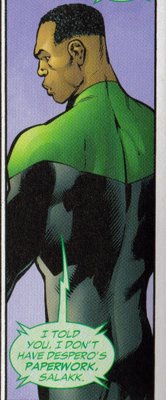
DC has had trouble with John Stewart. They have five Green Lanterns (once again, Jade doesn't count) and each one was slated, after Rebirth, to appear regularly in a book. Hal got Green Lantern, Alan got JSA, Guy and Kyle each had roles in two miniseries, and John would get JLA.
The one year later solicits have revealed a few changes. JLA is being canned. John has only had a marginal role anyway, so its not much of a loss. Kyle's getting an ongoing. Guy's supposed to be headlining Green Lantern Corps when it actually starts (although I find it suspicious that it hasn't been solicited yet). John is only marginally mentioned.
He does, however, appear in the Green Lantern ongoing.
Just not nearly enough.
Yes, there's more to this.
Now, I like John Stewart. I think DC's writers do, also. But it's hard to think of things to do with him that aren't better suited to one of the other three. Hal, Guy, Alan, and Kyle all have distinctive aspects to their personality that just invite certain types of stories. Even the JLU version, when you get down to it, is basically a hard-ass version of Hal Jordan, and attracts the type of stories that in the regular DCU would go to Hal.
A lot of fans might tell you that the problem is that John has no distinctive aspects to his personality.
They would be wrong, of course.
 John Stewart was heavily fleshed out in Green Lantern: Mosaic. Outside of Mosaic, I think John's written like a Virgo. Meticulous and detail-oriented, but still able to pull back, see the big picture and adjust accordingly. It's a good surface personality, and fits well into the Mosaic storyline, especially the issue where Hal confronted him. Hal thought his friend was losing his mind, but John was just undergoing such changes that his true self was bubbling to the surface. On the surface, however, John is a Virgo and Virgo isn't really an exciting and sexy sign. Their personality type isn't the kind you see in high adventure, not like a reckless Leo, a tempermental Aries, or a busyminded Gemini. The writers get distracted by these other personalities, and so they follow them and leave John alone.
John Stewart was heavily fleshed out in Green Lantern: Mosaic. Outside of Mosaic, I think John's written like a Virgo. Meticulous and detail-oriented, but still able to pull back, see the big picture and adjust accordingly. It's a good surface personality, and fits well into the Mosaic storyline, especially the issue where Hal confronted him. Hal thought his friend was losing his mind, but John was just undergoing such changes that his true self was bubbling to the surface. On the surface, however, John is a Virgo and Virgo isn't really an exciting and sexy sign. Their personality type isn't the kind you see in high adventure, not like a reckless Leo, a tempermental Aries, or a busyminded Gemini. The writers get distracted by these other personalities, and so they follow them and leave John alone.
 That's one of the great things about Green Lantern: Rebirth to me. We see the John Stewart of Mosaic again. The mature John who kept his social activism/conscience. And it's not social conscience like Green Arrow. Oliver Queen mainly comes off as a blowhard. John Stewart doesn't simply sound off about the symptoms and the wrongness of the issue. He's an Earth-type, but his mind is a razor-sharp sword, that pierces to the heart of the matter. Even under the influence of Parallax, he's sharp enough to give Batman a verbal beating like he's never had before.
That's one of the great things about Green Lantern: Rebirth to me. We see the John Stewart of Mosaic again. The mature John who kept his social activism/conscience. And it's not social conscience like Green Arrow. Oliver Queen mainly comes off as a blowhard. John Stewart doesn't simply sound off about the symptoms and the wrongness of the issue. He's an Earth-type, but his mind is a razor-sharp sword, that pierces to the heart of the matter. Even under the influence of Parallax, he's sharp enough to give Batman a verbal beating like he's never had before.  And he follows up next issue by physically beating the snot out of the entire JLA (with a little help from Guy). This is the John we lost after Emerald Twilight. Our multifaceted rock. Our grounded philosopher. Our thinking bruiser. Our self-examining, endlessly questioning warrior/poet/social critic. John Stewart, the fully rounded, fully realized, fully effective character was back. If only for one mini-series.
And he follows up next issue by physically beating the snot out of the entire JLA (with a little help from Guy). This is the John we lost after Emerald Twilight. Our multifaceted rock. Our grounded philosopher. Our thinking bruiser. Our self-examining, endlessly questioning warrior/poet/social critic. John Stewart, the fully rounded, fully realized, fully effective character was back. If only for one mini-series.
As rich and deep and soulful as John is, he's still left to the wayside.

Why?
Is it the Earthly, solid surface to his personality? Does this superficial personality seem to boring in an action story? Does he lend himself better to introspection?
Or is it, as some contend, his race?
Or is it a combination of the the two?
John's motives, values, and personality encourage social activism. Now, this is responsible social activism, mind you, not simply the venting partisan paranoia of some loudmouths we know, but a fully rounded fully realized responsible consideration of the issues. John is no slave to a political ideology, or any foolish consistancy. Nor is he fickle or reactionary. He is a truly radical thinker. He avoids camp mentality. Instead, he's a reasoner who adjusts, learns, and grows. John's social activism works best in a situation that shows both sides of an uncertain conflict. There, he can mediate a blanced solution that involves openness, education and understanding.
To say it short and simple, a good John Stewart story needs to be long and complex.
 This leads us to two problems. First, and this may be a shock, John is a black man. That is not a coloring error. This gives us a combination-prejudice problem with his writing. From his story options glares one stunningly obvious theme. This theme was used well at his conception, but after 34 years writers may still find this theme too irresistable not to use, which then leads to a paranoid perception of John-- "He's black, so if we do a racial tolerance story it'll be seen as stereotyping" combines with "He's black, so let's make it a racial tolerance story" to create John's most recent role in Green Lantern, which involves bitching at Hal for joining the USAF, calling Hal at the scene of a car accident, bitching at Hal for the paperwork, and giving Hal a message Superman felt to socially awkward to deliver personally.
This leads us to two problems. First, and this may be a shock, John is a black man. That is not a coloring error. This gives us a combination-prejudice problem with his writing. From his story options glares one stunningly obvious theme. This theme was used well at his conception, but after 34 years writers may still find this theme too irresistable not to use, which then leads to a paranoid perception of John-- "He's black, so if we do a racial tolerance story it'll be seen as stereotyping" combines with "He's black, so let's make it a racial tolerance story" to create John's most recent role in Green Lantern, which involves bitching at Hal for joining the USAF, calling Hal at the scene of a car accident, bitching at Hal for the paperwork, and giving Hal a message Superman felt to socially awkward to deliver personally.
I know we all have our personal crusades, and many of us pursue a social cause exclusively. But John is a comic book character. He needs to be flexible and appeal to the widest audience possible from the start, so that he will sell, and develop a large enough fanbase to stick around. And John has loads of potential. We need him to stick around for another Gerard Jones. We don't need him slaughtered in the company crossover.
Secondly, John suffers from the stigma of social commentary. As superhero fans, we don't like it and we don't want to hear about it. I don't believe this is because fanboys are fangirls are necessarily bigoted by nature. Variety is the spice of life, and I've never heard objections to a character being a different gender, color or sexual orientation than is usually seen unless the character has been previously established as otherwise (though, for the record, I could've sworn Kyle was Asian from JLA those first few years, and I know for a fact I'm not the only one who made that mistake, so him not being 100% Irish isn't really a big deal) such as the Starboy reboot (which yielded a really awesome character design). It's more because any social awareness stories are reminders of the crappiness of existence, which we are attempt to escape from by diving into our stories about heroes and villains with absurb powers and motivations. A little reality, yes, is welcome. We want to laugh, so jokes about trying to make the bills and such are wecome. We want our bad guys as bad as bad can be, so a certain degree of grim and grittiness is generally acceptable. We want to empathize with our characters (just not through their helplessness!), so stories of complex motivations, failed romance, and a certain degree of tragedy is also encouraged.
There is, however, a limit.
In general, we don't like to be reminded of the idiocy of the human race as a whole.
We're after superhero stories, not after-school specials. If we want a life lesson, we will look for it. But as it is, if I see a female character I want her beating up bad guys, not wailing endlessly about the double standard. If I see a gay character, and he wants to get married, well, he'd better just move to Massachusetts and get on with it rather than spend a twelve-issue storyline fighting the governor. Again, more butt kicking, less preaching. And if I see a different colored character, I do not want them stopped at the door of the country club while the bad guy gets away. I want them to bust through, beat up the bad guy, and then get thanked.
Part of the problem of "A Very Special Issue" stories is the major let-down at the end. The injustice is too big to just punch away. The hero is usually deeply unsatisfied with the outcome, because it must be realistic (realistic = no hope). In order to lend weight to the issue, a feeling fo helplessness and impotence must be portrayed.
Case in point: Green Lantern: Brother's Keeper.
Kyle Rayner's Assistant Terry Berg (who, up until this point was a cute fun character with a crush on Kyle) is seen on a date with his boyfriend (who is a dead ringer for Kyle, talk about having a type, Terry!). They kiss in front of your standard, faceless, mob of morons. Morons beat the crap out of Terry. Kyle spends half the issue in the hospital waiting room, and the other half beating up the morons (which was not nearly as satisfying as it should have been) and asteroids. Oh, and bitching to Wally and Hal. GLAAD apparently gave Judd Winick some sort of award over this comic.
Morons beat the crap out of Terry. Kyle spends half the issue in the hospital waiting room, and the other half beating up the morons (which was not nearly as satisfying as it should have been) and asteroids. Oh, and bitching to Wally and Hal. GLAAD apparently gave Judd Winick some sort of award over this comic.
GLAAD knows shit about comic books.
Many fans still despise this storyline. Mentioning the name Terry Berg will attract much venom on most message boards, as the character is seen as a means to "hijack Green Lantern" for a social agenda. I very much doubt this is a reaction to the social issue itself. It's more the mood of the story. It was depressing and hopeless. The theme was helplessness. Kyle was coming off of an unbelievable power-up. Winick manufactured this situation to drive home the point of pointlessness. Kyle beats the crap out of the perpetrators, but cannot change their views, cannot change what they have done, and ultimately, cannot change the world. He's so insanely powerfuly compared to the featured morons he even feels like a bully for beating them up. The editorial point of the story was to make Kyle hate humanity and want to leave Earth.
It worked. Kyle was so disgusted he up and left that night, and so did many of his fans.
I'm sorry, this sucks.
I don't want to read a superhero story and get this much powerlessness out of it. I have little enough power in reality, I want hope and triumph in my fantasies. Villains so evil as to be inhuman must run away in the end with their tails between their legs. Heroes, even when setback, must retain some measure of control over their lives. Helplessness, injustice, that's fine for the middle of the story. But you don't end it with no progress. The situation needs resolution or resolve. At the end of the stroy, the problem must be solved or the hero must be resolved to solve it at a later date. In addition to doubling the hero's determination for change, some small progress must at least be made. Just one person needs to change their mind for the better.
This is the twofold problem of social commentary stories. The situation cannot be properly resolved, because it is a direct mirror to our society's unsolved problems. The underlying problem is too big to be resolved by a single person, and if it is resolved it is disrespecting the problem as a whole and destroying the faint reflection of reality in the story. Solving the situation that stirs up the underlying problem in a manageable storyline in a way that is satisfactory to the readers and respectful of the difficulty is a delicate line, and one most writers do not have the balance to walk. And they know this. So many of them don't even try.
Witness Wonder Woman. She can never eradicate sexism. There's only one of her. Yet, in the early stories, she seemed unstoppable. No one could resist her reasoning. She used a message of tolerance and understanding (and... hehe.. loving submission) to turn nearly every enemy she made into a friend, even that Nazi baroness! She's suffered badly since Crisis, and I think that's because they kept the "Mission to spread Tolerance" but will never let her win anymore. When writers use her to bring awareness to women's issues (The Once and Future Story), there's a hideous fatalism to the story. You are reading a tragedy. This is Wonder Woman's life mission, and it is doomed to tragedy. Wonder Woman should not be a tragedy, it should be fun and hopeful. She should be something women want to be!
Likewise, John Stewart should be someone fun to be.
He has one of the best concepts in all of comicdom. But due to the combination of being the only fully non-caucasion male Green Lantern flying about and having a history of being used for social commentary (good and bad stuff), he's become difficult to handle. Stewart's most unique strength is his social conscience. He looks at people and power and questions their motives, he looks at his friends and questions their motives, he looks at himself and questions his own motives. He's a character that lends himself to social activism.
But it is hard, in these pessimistic times, to tell a tale of social awareness and instill hope.
 Green Lantern: Mosaic managed this. I think it's because the mirror wasn't so direct. I mean, it was firking obvious that they were talking about tolerance, but the messages wasn't hammered into the reader's head. It wasn't simplified, if anything, it was complicated more. Simply because it was damned wierd! Religious tolerence was explored with the Orthodox poulty, homicidal triplets and the displaced Crow Ridge Indian Reservation. Understanding through singing plants, Sex and violence and resurrection, something red, yellow trucks, yuppie copycats and the whole damned mess was about cultural tolerance!
Green Lantern: Mosaic managed this. I think it's because the mirror wasn't so direct. I mean, it was firking obvious that they were talking about tolerance, but the messages wasn't hammered into the reader's head. It wasn't simplified, if anything, it was complicated more. Simply because it was damned wierd! Religious tolerence was explored with the Orthodox poulty, homicidal triplets and the displaced Crow Ridge Indian Reservation. Understanding through singing plants, Sex and violence and resurrection, something red, yellow trucks, yuppie copycats and the whole damned mess was about cultural tolerance!
And more than that, Green Lantern: Mosaic was fun. John got to make jokes.
Now that I think of it, Star Trek has the same advantage. By exploring social issues through an alien culture, they maintained just enough closeness to recognize the issue, but had enough of a distance that fans could explore the situation objectively, and engender enough hope that the audience doesn't feel like total defecation when the credits role.
This is the main advantage of all science fiction.
So why the hell are our Superheroes spending so much time in earthly problems they can't solve?
I mean, I think its vital to the story and the message of any social awareness plot that the heroes be allowed to change things for the better. Social commentary set on Earth restricts that change so as not to compromise the "mirror" so much that we can't suspend our disbelief anymore.



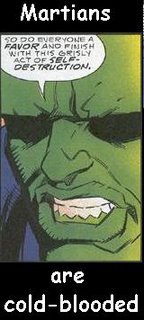



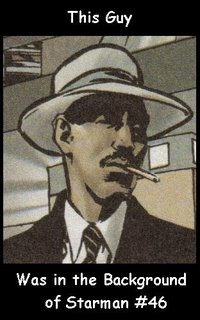


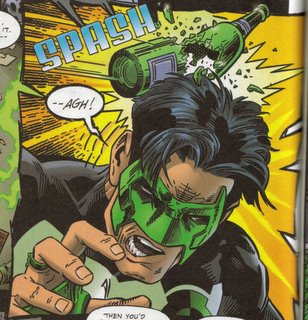
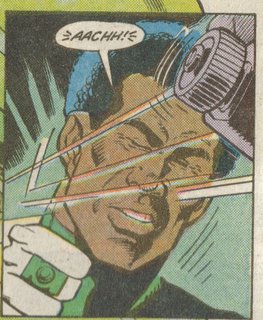
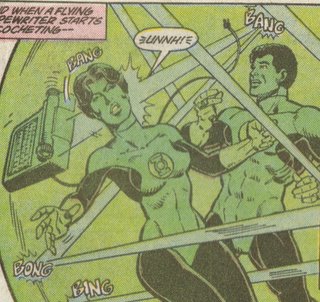

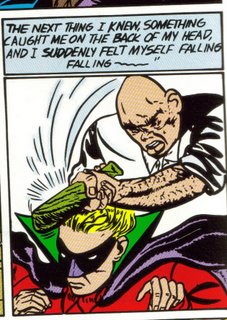
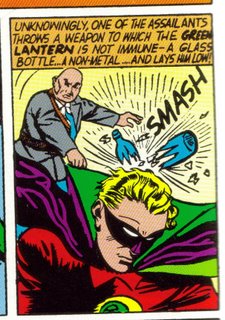
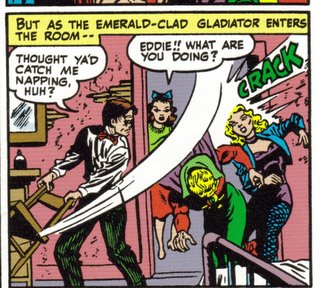

 DC has had trouble with John Stewart. They have five Green Lanterns (once again, Jade doesn't count) and each one was slated, after Rebirth, to appear regularly in a book. Hal got Green Lantern, Alan got JSA, Guy and Kyle each had roles in two miniseries, and John would get JLA.
DC has had trouble with John Stewart. They have five Green Lanterns (once again, Jade doesn't count) and each one was slated, after Rebirth, to appear regularly in a book. Hal got Green Lantern, Alan got JSA, Guy and Kyle each had roles in two miniseries, and John would get JLA. John Stewart was heavily fleshed out in Green Lantern: Mosaic. Outside of Mosaic, I think John's written like a Virgo. Meticulous and detail-oriented, but still able to pull back, see the big picture and adjust accordingly. It's a good surface personality, and fits well into the Mosaic storyline, especially the issue where Hal confronted him. Hal thought his friend was losing his mind, but John was just undergoing such changes that his true self was bubbling to the surface. On the surface, however, John is a Virgo and Virgo isn't really an exciting and sexy sign. Their personality type isn't the kind you see in high adventure, not like a reckless Leo, a tempermental Aries, or a busyminded Gemini. The writers get distracted by these other personalities, and so they follow them and leave John alone.
John Stewart was heavily fleshed out in Green Lantern: Mosaic. Outside of Mosaic, I think John's written like a Virgo. Meticulous and detail-oriented, but still able to pull back, see the big picture and adjust accordingly. It's a good surface personality, and fits well into the Mosaic storyline, especially the issue where Hal confronted him. Hal thought his friend was losing his mind, but John was just undergoing such changes that his true self was bubbling to the surface. On the surface, however, John is a Virgo and Virgo isn't really an exciting and sexy sign. Their personality type isn't the kind you see in high adventure, not like a reckless Leo, a tempermental Aries, or a busyminded Gemini. The writers get distracted by these other personalities, and so they follow them and leave John alone. That's one of the great things about Green Lantern: Rebirth to me. We see the John Stewart of Mosaic again. The mature John who kept his social activism/conscience. And it's not social conscience like Green Arrow. Oliver Queen mainly comes off as a blowhard. John Stewart doesn't simply sound off about the symptoms and the wrongness of the issue. He's an Earth-type, but his mind is a razor-sharp sword, that pierces to the heart of the matter. Even under the influence of Parallax, he's sharp enough to give Batman a verbal beating like he's never had before.
That's one of the great things about Green Lantern: Rebirth to me. We see the John Stewart of Mosaic again. The mature John who kept his social activism/conscience. And it's not social conscience like Green Arrow. Oliver Queen mainly comes off as a blowhard. John Stewart doesn't simply sound off about the symptoms and the wrongness of the issue. He's an Earth-type, but his mind is a razor-sharp sword, that pierces to the heart of the matter. Even under the influence of Parallax, he's sharp enough to give Batman a verbal beating like he's never had before.  And he follows up next issue by physically beating the snot out of the entire JLA (with a little help from Guy). This is the John we lost after Emerald Twilight. Our multifaceted rock. Our grounded philosopher. Our thinking bruiser. Our self-examining, endlessly questioning warrior/poet/social critic. John Stewart, the fully rounded, fully realized, fully effective character was back. If only for one mini-series.
And he follows up next issue by physically beating the snot out of the entire JLA (with a little help from Guy). This is the John we lost after Emerald Twilight. Our multifaceted rock. Our grounded philosopher. Our thinking bruiser. Our self-examining, endlessly questioning warrior/poet/social critic. John Stewart, the fully rounded, fully realized, fully effective character was back. If only for one mini-series.
 This leads us to two problems. First, and this may be a shock, John is a black man. That is not a coloring error. This gives us a combination-prejudice problem with his writing. From his story options glares one stunningly obvious theme. This theme was used well at his conception, but after 34 years writers may still find this theme too irresistable not to use, which then leads to a paranoid perception of John-- "He's black, so if we do a racial tolerance story it'll be seen as stereotyping" combines with "He's black, so let's make it a racial tolerance story" to create John's most recent role in Green Lantern, which involves bitching at Hal for joining the USAF, calling Hal at the scene of a car accident, bitching at Hal for the paperwork, and giving Hal a message Superman felt to socially awkward to deliver personally.
This leads us to two problems. First, and this may be a shock, John is a black man. That is not a coloring error. This gives us a combination-prejudice problem with his writing. From his story options glares one stunningly obvious theme. This theme was used well at his conception, but after 34 years writers may still find this theme too irresistable not to use, which then leads to a paranoid perception of John-- "He's black, so if we do a racial tolerance story it'll be seen as stereotyping" combines with "He's black, so let's make it a racial tolerance story" to create John's most recent role in Green Lantern, which involves bitching at Hal for joining the USAF, calling Hal at the scene of a car accident, bitching at Hal for the paperwork, and giving Hal a message Superman felt to socially awkward to deliver personally. Morons beat the crap out of Terry. Kyle spends half the issue in the hospital waiting room, and the other half beating up the morons (which was not nearly as satisfying as it should have been) and asteroids. Oh, and bitching to Wally and Hal. GLAAD apparently gave Judd Winick some sort of award over this comic.
Morons beat the crap out of Terry. Kyle spends half the issue in the hospital waiting room, and the other half beating up the morons (which was not nearly as satisfying as it should have been) and asteroids. Oh, and bitching to Wally and Hal. GLAAD apparently gave Judd Winick some sort of award over this comic. Green Lantern: Mosaic managed this. I think it's because the mirror wasn't so direct. I mean, it was firking obvious that they were talking about tolerance, but the messages wasn't hammered into the reader's head. It wasn't simplified, if anything, it was complicated more. Simply because it was damned wierd! Religious tolerence was explored with the Orthodox poulty, homicidal triplets and the displaced Crow Ridge Indian Reservation. Understanding through singing plants, Sex and violence and resurrection, something red, yellow trucks, yuppie copycats and the whole damned mess was about cultural tolerance!
Green Lantern: Mosaic managed this. I think it's because the mirror wasn't so direct. I mean, it was firking obvious that they were talking about tolerance, but the messages wasn't hammered into the reader's head. It wasn't simplified, if anything, it was complicated more. Simply because it was damned wierd! Religious tolerence was explored with the Orthodox poulty, homicidal triplets and the displaced Crow Ridge Indian Reservation. Understanding through singing plants, Sex and violence and resurrection, something red, yellow trucks, yuppie copycats and the whole damned mess was about cultural tolerance!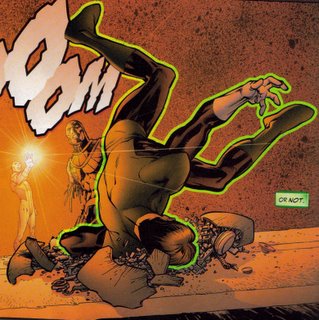 Now, this image shouldn't count, because it's in mid-battle, right?
Now, this image shouldn't count, because it's in mid-battle, right?
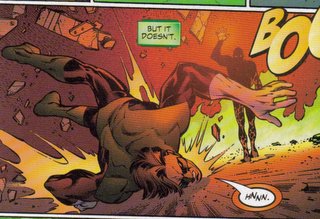 Welcome Back, Hal
Welcome Back, Hal 